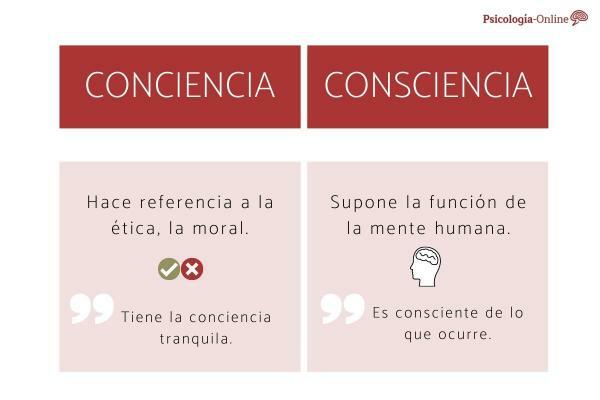For Rosa Vera García and Carmen Moyano Rojas. March 12, 2018
As you can see in the article, if you start from the knowledge of the characteristic features of human beings offered by the Psychological Science, it is possible to compare and classify people, according to needs and objectives, achieving an assessment by relating them to statistical "normality", with the characteristics of the most. But, it happens that the valuation of these personal traits is highly variable in space and time, from form that a determining and valid socio-historical framework is configured for a given moment and not for other.
One of the instruments to take into account and provided by the disciplines at the service of social control (including Psychology), is everything that refers to normativity, as an exteriorization and signal of what should be, and which is part of a type of situated thinking, born from the union of the social behaviors and the power relationships.
Normativity, as a daily function, would imply the institutionalization - subjectivization - of what is correct and what is not. The correct thing is what is in accordance with the norms and the wrong thing will be the transgressive behaviors -discordant with the norms- and therefore persecuted. For this reason, as Canguilhem (1976) (1) points out, in the context of life “
In our analysis, by positioning ourselves critically, we are questioning that reality exists regardless of the way in which we access it. We can take this position from the perspective of socio-constructionism that we saw in Ibáñez (1994) (2).
In this way, the regulation or standardization of conduct, feelings and thoughts, makes what is different is classified as problematic, what is not true, nor legitimate, nor valid..., or what is prohibited. As with transgression. This "skipping" the rules, supposes that the subject has not been able to adapt to the law built in society, and also supposes the need for the established social powers take care of it, and take corrective actions to correct these deviations, and even the penalize.
In this sense, psychology has played a very important role, because from all its branches, and together with modern Western thought, it has contributed to the "Normalization" indicating what is "desirable" and "good", by pointing out the correct values, beliefs and traditions for each system Social. And what happens in reality is that normative behaviors are as "natural" and true as transgressions or different behaviors. Because the so-called natural laws are only constructs, but presented as objective, real, empirical and compliance mandatory for people, when what it is about is mere social conventions, or survival mechanisms for society. In this way, reality is shaped according to oppositions and dichotomies, with polarities and differences. Cartesians who accept, prescribe or reject some behaviors that depend on the contexts in which they are originate. But, the facts are not normative or different without a socio-historical reference point. Each culture and time has rules that regulate what is different, pointing out and punishing what is "undesirable" for that society. For this reason, transgression is born from standardization. That there is a social regulation facilitates the possibility for the individual to violate the norm and do prohibited things in a socially constructed area, which legalizes the exercise of power against those who transgress the norm by skipping the discourses that construct the objects and that give them meaning, always in the normal / non-normal binomial.

In the analysis article, the “difference” production practices have been carried out based on a series of parameters that are not completely neutral and research techniques have been used (observation and measurement) that may present imprecision and bias biases (page 15). module). They are not neutral because different authors have used parameters that are later inferred in highly cultural contexts. different as the case of Marcus et al. (1987) with subjects from Israel while Chapman and Chapman (1987) with groups from Wisconsin (USA). The bias could be given, since none of them include the influence that marks the context of the researchers and that they have reached one or the other. conclusion: its values, its beliefs, its interests, its theoretical position, etc., is not revealed in how it has been able to influence when obtaining its conclusions.
We clearly see how the construction of the normal-pathological dichotomy has taken place, that is, difference, in the evolution that the history of explanatory theories of Schizophrenia. As the environment or context has marked everything that was understood as normal, and what could not be included in it was excluded and marked as pathological. But what in a given context could be included within the framework of normality, in a later context it was being excluded as the context expanded. As we can read in the module (p. 59), “As the psychosocial framework has incorporated new variables and factors, such as the ecological niche in which the person is inserted, the characteristics of the personality, the subject's social network, etc., certain characteristics that, if not fulfilled by the subject, made him be excluded in the "normal" and included in the "pathological" directly”. The pathological appears as what is faced with the normal, or as we said before, what transgresses normality, what is different.
In this way, the problem will be in finding the correct way, which is adequate to all the variables that must be considered, to establish the concept of "normality" without biases, such as the sex to which the subject belongs, for example. The "normal" will be the "desirable", who has not heard today, "... you can deal with him, he is a normal person ...", But what does that definition of "normal person" include? And why is that definition correct and not another? Who can become a "knower" of the knowledge necessary to establish this definition?
On the other hand, these types of practices come into play when they need to be at the service of the specific social system of the context. When the transformation of the entire social, economic and political organization of the Western world takes place, all those who cannot be inserted in the prevailing labor system, were excluded, and for this a disciplinary power was needed to regulate this situation, and to take care of classifying the different pathologies, "normalizing" that situation. exclusion.
We believe, therefore, that all the articles proposed for this PEC place us in the reflexive provocation on the sociogenesis of referents and etiologies of the labels, taxonomies, and conceptualizations (rhetoric in short), in addition to their processes and developments until the current instrumentalization that we make of them, depending on the history, time and type of society.
As an example, some of the rhetorics used by this discipline are: the DSM classification (III and IV), ICD-10. Also in this line of narrative we find terminologies such as: the productive character, "As an activity for the production of psychological scientific knowledge to obtain information and thought about the human being" (P. 11 Module) and the regulative character, what “Compares the results from exams, tests, tests, etc. on which people are valued and differentiated according to needs and objectives " (Page 11 Module). The article that concerns us meets these two premises, it is a production activity to obtain information that fact is summarized in the conclusion of the empirical study and the method it uses is regulative insofar as it does so "in reference to".
Therefore, through the different rhetorical instruments that Science has, the task of these will be to regulate the different opposing positions that are generated in a certain scheme Social.
The adjective abnormal is assigned a pejorative meaning And although some abnormalities are positive - a high IQ - we deal with behaviors or pathologies such as Schizophrenia that make it difficult to function in everyday life. However, the criteria for defining abnormality are also a function of social or interpersonal criteria, as analyzed in the article by Biglia B. (1999) (3); in this way we will understand the definition of abnormality from the sociocultural variables. We can give examples, such as substance abuse in our culture is considered a disorder and in others as a form of contact with divinities.
However, in the article that we analyze, all the variables that are considered are clinical psychologist criteria with different monocausal or multi-causal contributions with a multitude of classifications regarding vulnerability or not, according to the previous taxonomy of personality types.
We are faced with classifications that perhaps allow a common language among professionals, but that have undesirable effects, leading to pejorative social stereotypes; that from a more radical point of view, such as the one called “antipsychiatric movement”. That debuting in the 1960s, antipsychiatry (a term first used by David Cooper in 1967), defined a model that openly challenged the fundamental theories and practices of psychiatry conventional. Psychiatrists like Ronald D. Laing argued that "Schizophrenia could be understood as an injury to the inner self, inflicted by parents who are too psychologically intrusive" (4).
These concepts act in us - in our cognitive and behavioral processes - as if they were intrinsic part of our "being or being in life" and not a construction that is due to subjectivization and prevailing ideologies at any time.
The definition of health or madness, of normality or abnormality, without considering its historical, social and temporal construction, as an adaptation or as an analog extension of what we believe to be, implies above all, reducing concepts to a confrontation: normality vs. abnormality; madness vs. sanity; reason vs. without reason; psychiatry vs. antipsychiatry..., a state of acceptance, submission, alienation or conformity with social imperatives (5). These concepts, which become references, lead us to hypothesize that all social norms are healthy, correct and ideal, if they comply with the regulations of the theories and practices of statistical averages (a way of measuring abnormality and normal). Thus, and, referring to madness or normality in particular, it implies having integrated a Values system, whether social, political, magical, religious or scientific (Psychology in the case at hand).
This exposition does not destroy all the necessary work and advantages that taxonomies and axiologies have brought to health or disease. But not everything is benefit, there are also risks - this is what this Pec is about, trying to reveal them-; for example systematization, especially in the field of mental health.
But the subtle thread of normality and health can lead us to qualify Saint John of the Cross, Einstein, Gandhi or Mother Teresa as pathological (within the abnormality). In fact we can find throughout our studies in Psychology a record of prominent personalities in history with supposed mental disorders: Copernicus, Newton and the Descartes himself who is taken as reference in the module that affects this Pec as people with Personality Disorders with Obsessive Neurosis, or with bipolar disorders such as Schopenhauer (6).
Approaching our times and our contemporary capitalist and globalized society, all that behavior that does not achieve the flexibility, speed and development capacity that it demands of us the ideal of a "well-adjusted" personRegardless of whether or not this ideal responds to the evolutionary needs of the human being or to their individual differences; is under the prism positivist within the framework of "abnormality".
As psychologists, sociologists, etc... we must take care of the authoritarian character or the power of wisdom (example of gross errors of psychological scientism such as the case of diagnosis of autism attributing the causes to the type of care provided by the mother, or going to more holocaustical extremes to the power of the Aryan race over the Jewish people) that, using the discursive practices of the objectivity of scientific positivism, masks ideological values and dichotomous values that reduce those not considered "Normal".
Schizophrenia, in this article, is analyzed from the modernity of the late nineteenth and twentieth centuries, where from Kraepelin, who raised a profound review of the mental illness concept, (a concept up to that moment organicist that becomes a psychologist), and that puts the accent on the history of the individual rather than on the disease itself.
In the conception that we propose to develop, the psychic illness (Insanity, Schizophrenia ...) could be seen as a negative symptom -depending on the historical moment- of some aspect of growth and the development that is outside the "clinical normality", transgresses and therefore the social control and regulation of the same.
Thus, the therapeutic taskFrom the rhetoric of objectivity, its goal is to discover and help to dissolve this abnormality, and to seek the development, prevention and promotion of health; but not to separate, punish, lock up the follies, Schizophrenias... etc., because from the also sickly argument of power and, using their The same taxonomies would be acting neurotically with the "abnormal"... as can be deduced from the experiences explained in the article by Biglia B. (1999) "Looking for L’Antipsichiatria Threads" (3).
However, and based on Austin's theories (7), communicative acting and speech acts determine the rhetoric in this case of the psychologist vision - that is, from the knowledge of the authorities of psychology such as those cited in the empirical study: “Andreasen and Akiskal, (1983); LandmarK (1982) Cloninger, Martín and Guze (1985) Zubin and Spring (1977), Kendler (1985)... "
But let's not forget that we can find not only an authoritarian potential but we can also find a emancipatory speech and of protest as the aforementioned antipsychiatric group and Foucault himself, or neutral as that of the conclusions of the study where you cannot close the questions and predict the role of personality in reference to Schizophrenia
To conclude, through the ages, it has been proposed to us how Psychology has emerged as a scientific discipline -Under the positivist paradigm most of the time- but, continuously, the influence of the socio-historical character has been omitted. This article gives us a good example of it. It has been presented to us as it was so and not otherwise, without giving a full explanation as to why it was so, that is, making reference to the objective, to the rational, but without making explicit the impact of the social, cultural and historical. As a frame of reference we propose the article by Escudero S. "About the name", on the elimination of the letter "P" and its probable consequences, such as the elimination of the contents of the word "Psicothema".
Through the critical reflection that has been carried out in the analysis of this article on Schizophrenia, we have tried to do an exercise questioning what it seems that cannot be questioned, problematizing it, allowing a deconstruction, and opening our minds to possible new approaches to this disorder.
According to what was stated by the authors Teresa Cabruja and Ana Isabel Garay in their book (9), this reflective practice, makes possible the "Enter clues to think in a different way what has frequently been presented to us as historical development and constitutive processes of psychology "and thus being able to,"... problematize some of its key pillars... through the critical psychology approach, giving an account of the feminist and socio-constructionist contributions " (9).
It is essential to give the importance it deserves to this critical reflection, due to the power of Psychology and the consequences that derive from it. From their constructions on normality, the pathological, their exercise is imposed and they work on correction and exclusion. The context under which this construction is carried out must be considered at all times, to try to make it the most possible objective and prevent it from being at the service of power and social control, as it seems that until now being. In short, to achieve a Psychology at the service of the Human Being.



